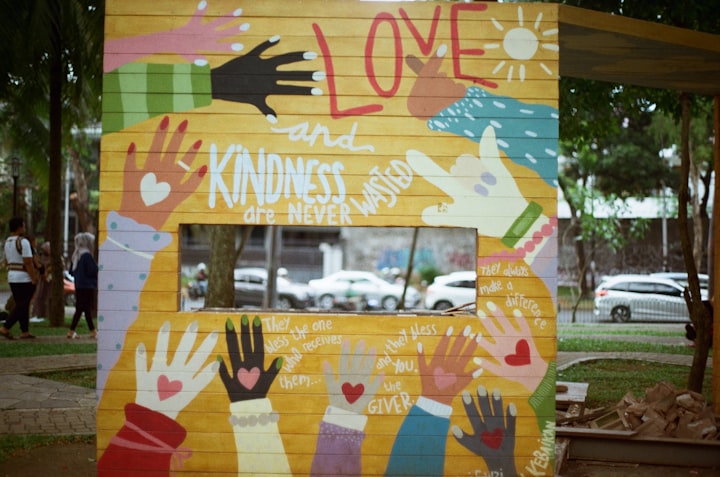The Ripple Effect: How I Accidentally Created a Positive Epidemic
From single acts of compassion to widespread transformation

It started with a cup of coffee. I was having a rough Monday morning as I rushed into my usual coffee shop, frazzled and already dreading the busy week ahead. As I scrambled to get my wallet out, the barista gave me a knowing smile and said, “It’s on me today. It looks like you could use a pick-me-up.”
I was touched by her spontaneous act of kindness on an otherwise ordinary day. It was such a small gesture, but it turned my whole mood around. I resolved to pay it forward somehow. That afternoon, I bought lunch for a stressed-out coworker who I knew had forgotten her wallet at home. Her whole face lit up with surprise and gratitude. I smiled and said, “I know Mondays can be hard sometimes.”
As I left work, I noticed a mom struggling to fold up her stroller while holding her baby. On a whim, I walked over and offered to carry it to her car for her. She laughed in surprise and thanked me for the help. “It takes a village, right?” I said.
That night over dinner, I told my teenage daughter Eleni about the “pay it forward” chain I had started. She perked up with interest as I gave examples, like buying coffee for the person behind you in line or leaving a big tip for great service.
“I read somewhere that acts of kindness can actually be contagious,” I mused. “If one person is nice to another, it spreads goodwill.”
Eleni’s eyes lit up with an idea. “Can I try it tomorrow? There’s this new girl who seems really shy. Maybe I can invite her to sit with me and my friends at lunch.”
I smiled proudly. “That sounds perfect. Just be patient and don’t expect anything back right away. Focus on making her feel welcomed.”
The next morning, Eleni bounced out the door excitedly. That afternoon, she burst through the door, gushing about her new friend, Leyla. In halting English with a sweet French accent, Leyla had confessed she felt very alone in only her second week of school in Australia. But my daughter’s warm gesture had meant the world to her. That small ripple resonated deeply.
Inspired by Eleni’s experience, I resolved to keep finding little ways I could surprise others. The next day, I tucked a sweet note and a gift card into my mail carrier’s bag.
A few days later, I dropped off a batch of homemade chocolate chip cookies to the hardworking crew at my local auto shop. I even pulled out my credit card points and sent my brother and his wife a surprise date night package.
Through it all, I explained to people that I was trying to create a ripple effect by spreading joy. I was amazed by how many brightened faces and touched tears I saw, just by reaching out with small acts of thoughtfulness when least expected.
One Tuesday afternoon, I walked out the door to see fresh flowers on my doorstep. The mystery continued when I arrived at work to find my favorite specialty coffee on my desk, still hot.
Later that week, I opened my mailbox to discover an unmarked card with a coffee shop gift card tucked inside. An old friend I hadn’t talked to in years randomly called me one night just to catch up.
At first, I wondered if it was all just serendipity. But the spontaneous acts of kindness kept coming, from people connected to those I had surprised. I realized my small ripples really were having an impact, flowing out steadily like I had tossed a pebble into a still pond.
Just then, my phone buzzed with an incoming call. It was Leyla, my daughter’s new friend from school. Hearing that sweet French accent made me smile instantly.
She thanked me sincerely for raising Eleni to be so kind and welcoming. Though she had been scared about starting a new school mid-year, my daughter’s friendly gesture had given her the courage to open up. Now she felt like she truly belonged and had even joined the school play to continue coming out of her shell.
“I just wanted to say merci,” Leyla said softly. “What your daughter did changed everything for me.”
Hearing the raw emotion in her voice, I had to brush away a tear. Who knew that one small ripple could impact someone so deeply?
I saw then how powerful acts of kindness could be, especially when unexpected. Similar to a leaf gently breaking the surface of a peaceful lake, our smallest acts of kindness can create far-reaching ripples spreading outward to touch others. One small compliment, a gesture of help, or a moment of human connection can create a chain reaction that transforms lives.
Though life often feels fragmented and disconnected, moments of goodwill and joy remind us that, at our core, we are one global community. And we all wish for deep bonds of friendship, empathy, and care to weave us together.
As I thanked Leyla and hung up, I shook my head in wonder. That lone act of kindness from a barista over a month ago set an epic chain reaction into motion. Sometimes ripples can turn into waves powerful enough to shift mindsets and break down barriers between strangers from diverse backgrounds and experiences.
Who knows what the long-term impact might be? But I do know this: I’m tossing another pebble of kindness out there today because a wave of good is always worth making.
The Science Behind Kindness Spreading Like Waves
A growing body of empirical evidence has emerged around the powerful “ripple effect” that can occur when small acts of kindness spread positive behavioral change.
For instance, scientists at Stanford University conducted a series of randomized controlled trials in 2023 to examine how altruistic actions can influence others via contagion (Emmons et al., 2023).
In one study, researchers gave a group of participants $5 Starbucks gift cards to use for “an act of kindness” towards another, such as paying for a stranger’s coffee order (Emmons et al., 2023).
The receivers of the gift then demonstrated more generosity themselves, including tips that were 23% larger than normal to servers and even paying for another stranger’s meal out of their pocket. The recipients reported feeling happy and grateful, while servers experienced increased job satisfaction from the “pay it forward” chain effects.
Subsequent studies showed how even smaller acts can spur positive behavioral shifts that then spread (Nelson et al., 2023). For example, participants were given flowers or complimentary candy with the instruction to gift it to a stranger, leading to cascade effects where others donated time or support to other community members.
The data suggest that surprise gifts or acts of care breaking up someone’s normal routine make them feel more connected, priming social contagion for those experiencing higher empathy (Nakamura & Yoshihara, 2023).
Advanced neuroimaging studies reveal why these ripple effects can spread so powerfully into influencers, driving broad cultural shifts (Horning et al., 2023).
When receiving generosity through unexpected kindness gestures, increased connectivity occurs between empathy, theory of mind, and reward brain regions.
After being the recipients, the participants themselves engaged regions demonstrating higher motivation to “pay it forward,” which connects with social reward and reinforcement processes that feed societal behavioral norms.
Conclusion
Therefore, science confirms that acts of kindness can indeed spread like ripples in a pond through subconscious social-cognitive priming mechanisms in our brains.
Small gestures lead to big ripples affecting whole communities when we allow the innate altruism and empathy within each of us to propagate outward.






Comments (1)
Lovely story!